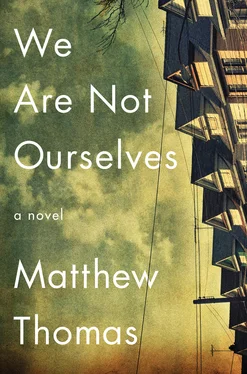It was the first hint of repose they’d had in who knew how long. She wanted to enjoy it as a family, but Connell took out the gloves, bounding around like a buck, and Ed rose to gratify him.
The sun was out after a sojourn behind some clouds. Planes glinted in the sunlight and gradually diminished in the distance, leaving a trail of noise. A light breeze took the edge off the heat. The moment struck her as perfect, in the way that quotidian moments sometimes did. She tried to freeze it in her mind: the acid sweetness of her apple, the crunch of it against her teeth, the smell of the grass. It was cheating, in a sense, to circumvent the natural sifting process of memory, but she found that those moments when she stopped and thought I’m awake! as though in the midst of a dream, were ones she remembered with an uncommon clarity.
Ed stood sturdily, a bit stodgily, as he waited for throws to arrive, though a surprising spring entered his step when he had to move laterally. His button-down shirt and dress slacks weren’t conducive to the activity, but he adjusted gamely. Connell’s accuracy suffered in his enthusiasm to return the ball almost as quickly as it landed in his glove. They started out close together. Connell seemed to want to spread out and drifted steadily back. Ed arced his throws in broad parabolas, and Connell threw on a line, though in his zeal he would sometimes overshoot and send Ed scurrying to retrieve the ball before it reached the street. A row of parked cars flanked them on either side. The last thing she wanted was for the pastoral quality of the moment to be shattered along with a window. Ed began to call Connell closer. The boy resisted at first but crept forward when Ed held the ball in his mitt and waved him toward him. They were back to a distance not much farther apart than they’d been when they first started throwing. Ed signaled to him to slow it down.
“Not so fast,” he said. “We’re just having fun.”
“I’m not throwing that hard, Dad,” Connell said.
But she could tell he was. He seemed to be reaching back and giving the throws all his strength. Ed was catching them, but he looked almost frightened at their speed.
“Slow it down,” Ed said, his voice skirting anger.
“Why? Can’t catch it?”
Connell unleashed a throw that came at Ed like a fist. Ed stepped aside and let it sail past. He gave the boy a look and went to retrieve it.
“That’s enough,” she said when Ed was out of earshot. “Your father asked you to stop throwing so hard.”
“I’m not! I’m not throwing my hardest.”
“Just listen to him.”
“Okay,” he said. “Relax, Mom.”
Ed looked more defeated than angry. He was at the mercy of the Darwinian logic of an adolescent, and he stood for a minute, seeming to consider his options, then threw the ball to Connell, who snatched it out of the air midhop.
She could see it before the ball left his hand, the coiled fury in Connell’s body. There was something majestic about the physical changes that turned a boy into a man, the inexorability of the need to advance, to clear away the previous generation and make room for the current one. There was also something terrifying about the impending clash between the males in her life. Neither would come out unscathed.
Maybe he was angry with his father for yelling at him in the car. Maybe he was upset that his father was having a hard time corralling his throws. Maybe it was that his father had always been a step behind some other fathers. Ed wasn’t just older, he was also old-fashioned, but he and Connell had always had baseball in common. Maybe it was too much for Connell to withstand aging’s incursion into his father’s ability to carry out this ritual. Whatever it was, he put everything he had into the throw, so that as it left his hand she let out a little involuntary gasp.
It came so fast at Ed that he seemed to freeze in anticipation of it. He didn’t even try to get out of its way. She could see, as time slowed for her observation, that sometime since she’d married him there’d been an attrition in his motor functions. His hand was no longer as fast as his mind. Even from that far away, she could see his eyes widen. The ball struck him square in the chest. He staggered and fell backward, first on his rear, then on his back.
She shouted and leapt to her feet and started running. Connell did the same. He was on his knees talking to Ed when she got there, and she pushed him aside. Ed was clutching his chest as though he’d had a heart attack. Connell was stammering apologies. He kept trying to get at Ed as she shoved him away. Then Ed was stiff-arming her as he rose to his elbows and looked at both of them.
“I’m fine, goddammit,” he said. “Let me stand up.”
As Ed stood, Eileen raised her hand at Connell and held it there, poised to smack him. She could feel the way the three of them were suspended in the moment as though in the relief of a sculpture. Her hand throbbed with the need to connect. Her son almost quivered in anticipation of the blow. She smacked him once, hard, on the face.
“The boy doesn’t know his own strength,” Ed said, taking hold of her ringing hand. He picked up the ball from the ground. “Get back out there.”
“Let’s go back to the blanket,” she said quietly.
“We’ve got a few more throws left.”
“We don’t have to play anymore,” Connell said to Ed. He wouldn’t look at her.
“We’re not done,” Ed said.
“Ed,” she pleaded, uncomfortable with every possibility she could imagine.
“Have a seat,” he said, pounding his glove. “Get going,” he said to Connell.
Connell walked out halfheartedly. Ed threw it to him and he lobbed it back.
“Harder!” Ed said.
Connell threw again with less force than he could have.
“Harder!” Ed yelled. “Air it out!”
• • •
That night, as they lay in bed, Eileen could see, at the V of his undershirt, the mark the baseball had made on his chest. She ran her hand over the spot; he picked her hand up in an oddly vertical way, as though lifting the cover to a butter dish, and moved it away in one swift motion.
They lay in silence, both flat on their backs, not an inch of their bodies touching, their arms flush against their sides, as though they were mummified. Her hand against her own thigh still registered a ghostly vibration of the smack she’d given Connell.
No matter how much they’d fought, the bedroom had always been an inviolate space. She could express things there that she couldn’t express elsewhere. She could cuddle up to him in a way that would have surprised the nurses she supervised. There was something old-fashioned, she knew, in the way she waited for him to take the lead. He’d never had a problem doing so. Touch was their high ground when the slick cliffs of words proved treacherous.
“I have a confession to make,” she said. “Yesterday, when I said I was with Cindy, I was really looking at houses.”
He gave her an irritated look and then shut his eyes as if he were sleeping. “I don’t know why you’re obsessed with leaving,” he said. “I like it here.”
“How can you say that? You’re not even here . You spend all your time on the couch. You could be in a sensory-deprivation chamber. You put those headphones on and don’t hear the horns honking or the car stereos pumping. I do all the grocery shopping, so you don’t get jostled in the aisles of Key Food and you don’t have to deal with the checkout girls not speaking English. You’re not a woman, so you don’t have to fear for your safety after dark.”
“Now’s not a good time,” he said.
“It is too a good time. Connell’s done at St. Joan’s. Haven’t we been in this hellhole long enough?”
Читать дальше
Конец ознакомительного отрывка
Купить книгу












